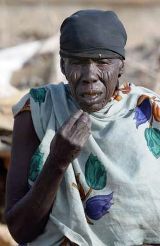Aid agencies find donors losing interest in Darfur’s plight
May 3, 2006 (LONDON) — The World Food Program is so strapped for funds, it has halved rations for Darfur refugees. Another U.N. agency in similar straits has stopped measles vaccinations for children in the wartorn region of western Sudan.
 Aid workers’ repeated pleas for money have gone unanswered, but some say they hope that will change now that Darfur peace talks are drawing global attention.
Aid workers’ repeated pleas for money have gone unanswered, but some say they hope that will change now that Darfur peace talks are drawing global attention.
“The fact that the World Food Program and other U.N. agencies and humanitarian organizations are having to scale back programs is deeply worrying, especially at a time when the conflict and insecurity is deteriorating rapidly,” said Malcolm Fleming, spokesman for the British charity Oxfam. “Now is not the time to be cutting funds for humanitarian work in Darfur.”
Aid agencies have been saying just that for months. But donors may be distracted by other crises, including drought-induced hunger elsewhere in Africa. And after three years, the world may just be inured to the suffering in Darfur.
Decades of low-level tribal clashes over land and water in Darfur erupted into large-scale violence in early 2003. The central Sudanese government denies accusations it responded by unleashing Arab tribal militias known as Janjaweed upon civilians. Well over 180,000 people are believed to have died in the fighting or in a resulting crisis of hunger and disease and more than 2 million have fled their homes, many to neighboring countries whose stability has been threatened by Darfur’s chaos.
“This is the third year of a complex emergency in which a lot of resources have gone. There is a certain amount of donor fatigue,” said Ted Chaiban, who heads Sudan operations for the U.N. Children’s Fund.
But Chaiban said donors had contacted him about providing funds after African Union negotiators set a deadline for the Sudanese government and Darfur rebels to agree to a peace deal, and after marches in the United States focused even more attention on the humanitarian crisis there. The AU deadline has not yet yielded a peace treaty, but appears to have triggered an international push for a solution. The United States sent its No. 2 diplomat to the peace talks in Nigeria and U.S. President George W. Bush called Sudan’s president this week to push for peace.
Chaiban said he was “hoping the attention will result in added resources. But there is an urgency. We need resources now,” he said.
Soon, annual rains will make it difficult to get materials to camps that are home to hundreds of thousands displaced by three years of fighting.
UNICEF, which has received only 16 percent of the funding it requested for Darfur this year, has stopped some educational programs, cut back on supplies for its childhood malnutrition programs and stopped measles vaccinations for children. If additional funds don’t come by July, the agency will have to cut staff, Chaiban said.
Chaiban said UNICEF had requested US$89 million (about A71 million)in funding for this year and so far received only US$15 million (about A12 million) from international donors.
In announcing its ration cuts last week, the World Food Program said it had received just US238 million, or 32 percent, of the US746 million it needed to help feed more than 6 million people in Darfur and elsewhere in Sudan this year.
“This is one of the hardest decisions I have ever made,” WFP director James Morris said last week. “Haven’t the people of Darfur suffered enough? Aren’t we adding insult to injury?”
(ST/AP)
